Hey there, fellow dog lovers! Are you ready to dive into the wonderful world of Aussiedoodles?
Let me tell you, these pups are something special. The Aussiedoodle is an excellent family dog, blending the intelligence of the Poodle with the friendly nature of the Australian Shepherd. From romping around with the kids to cuddling up with other furry friends, these incredibly affectionate dogs will quickly become the heart and soul of your household.
Ever since my childhood days with my trusty Labrador by my side, I’ve been fascinated by our furry friends. That’s why I’m thrilled to share my passion for dogs with you through this comprehensive guide to Aussiedoodles.
In this guide, I’ll cover everything you need to know about Aussiedoodles, from their fascinating history to their unique characteristics and temperament. Whether you’re a seasoned pet parent or considering adding a new furry member to your family, this guide has you covered.
So, grab a cup of coffee, cozy up with your current canine companion, and get ready to fall head over heels for Aussiedoodles. Trust me, by the end of this guide, you’ll be counting down the seconds until you can bring one of these lovable pups into your life.
TABLE OF CONTENTS
- Aussiedoodle Quick Breed Summary
- History and Origins
- Breed Characteristics of Aussiedoodles
- Common Health Issues
- Care and Maintenance
- Training and Socialization
- The Cost of Living With An Aussiedoodle
- How Much Does Living With An Aussiedoodle Cost?
- So, Should I Get An Aussiedoodle?
- FAQs on Aussiedoodles
- Final Woof: The Lovable Crossbreed
Aussiedoodle Quick Breed Summary
History and Origins
From Adobe Stock
The story of the Aussiedoodle, or the Aussie Poo, is as captivating as the breed itself. To truly appreciate this delightful hybrid, we must unravel the rich histories of its parent breeds: the Australian Shepherd and the Poodle.
Background of the Parent Breeds
From Adobe Stock
The Australian Shepherd, despite its misleading name, found its roots in the rugged landscapes of the United States during the 19th century. These versatile herding dogs embodied the pioneering spirit of the American West. Renowned for their sharp intelligence, remarkable agility, and innate herding instincts, Australian Shepherds swiftly endeared themselves to ranchers and farmers across the nation. Their striking coats and boundless energy made them indispensable working companions, adept at wrangling livestock in the sprawling pastures of the frontier.
From Adobe Stock
In stark contrast, the Poodle boasts a lineage steeped in European elegance and refinement. Originating in Germany, the Poodle was initially bred as a water retriever, prized for its remarkable swimming abilities and keen intelligence. Additionally, Poodles were also used as gun dogs, well known for their duck-hunting abilities. Over time, the Poodle transcended its humble origins to become a beloved companion among European nobility. With its distinctive coat and aristocratic demeanor, the Poodle graced the courts and salons of the continent, earning a reputation as much for its charm as for its remarkable versatility.
A favorite of Royalty, these dogs have been seen as the pets of the rich for the past 400 years.
The Development of the Aussiedoodle
The Aussiedoodle emerged from the union of these two illustrious breeds, blending the best traits of both parents into a captivating canine companion. The objective was clear: to create a dog that combined the intelligence and low-shedding coat of the Poodle with the loyalty and athleticism of the Australian Shepherd.
While the exact origins of the Aussiedoodle remain shrouded in mystery, like many hybrid breeds, it is believed to have gained prominence in the United States during the latter half of the 20th century. Initially bred for their desirable qualities, Aussiedoodles swiftly garnered admiration from dog enthusiasts worldwide. Their affectionate nature, playful demeanor, and remarkable trainability endeared them to families and individuals seeking a devoted and dynamic canine companion.
As Aussiedoodles continue to captivate hearts with their charm and charisma, their legacy as beloved companions only continues to grow. With each wag of their tail and playful bounce, these endearing hybrids reaffirm their status as cherished members of countless households, embodying the best of both their remarkable parent breeds.
More Information
The Poodle parent can be of any size like the toy poodle for example, but it is usually standard or miniature, depending upon which Poodle parent is used you can have three sizes:
- Aussiedoodle
- Mini / Miniature Aussiedoodle
- Toy Aussiedoodle
As this breed is a crossbreed, they are not recognized by any major Kennel Clubs, but both of the parent breeds are recognized as they are purebred dogs.
Both of the parent breeds of this dog are incredibly intelligent, and thus they are something of a genius. This results in them getting bored very easily, and these dogs will require mental stimulation – lots of it! Without it, they can become destructive.
Breed Characteristics of Aussiedoodles
From Adobe Stock
Aussiedoodles are a delightful combination of brains, beauty, and boundless energy. Let’s explore the unique characteristics that define this captivating hybrid breed:
Physical Appearance
This Australian Shepherd Poodle mix comes in a variety of shapes and sizes, reflecting the diversity of their parent breeds. While individual appearances may vary, these dogs typically exhibit a harmonious blend of traits from both Australian Shepherds and Poodles. They often boast a sturdy build with a well-proportioned body, expressive eyes, and a distinctive, intelligent gaze that hints at their sharp intellect.
Coat Types and Colors
One of the most appealing features of Aussiedoodles is their luxurious coat, which can vary in texture and color. Their coats may range from wavy to curly, with some individuals inheriting the hypoallergenic, non-shedding qualities of their Poodle ancestors. Aussiedoodles come in a dazzling array of colors, including but not limited to black, blue merle, red, chocolate, and cream, often adorned with striking markings and patterns.
Size and Weight
Aussiedoodles exhibit a wide range of sizes, depending on the size of their Poodle parent. They may range from miniature to standard, with variations in height and weight to match. Miniature Aussiedoodles typically stand between 12 to 18 inches tall at the shoulder and weigh anywhere from 10 to 25 pounds, while standard Aussiedoodles can reach heights of 20 to 24 inches and weigh between 40 to 70 pounds or more.
Temperament Traits
Known for their winning personalities and playful demeanor, Aussiedoodles are a joy to be around. These intelligent and affectionate dogs thrive on human companionship and excel at forming strong bonds with their families. They are known for their outgoing nature, eager-to-please attitude, and boundless enthusiasm for life. Aussiedoodles are highly trainable and adaptable, making them well-suited for various roles, including therapy and service work.
Suitability for Families, Singles, and Seniors
With their gentle disposition and adaptable nature, Aussiedoodles make excellent companions for individuals and families alike. Their friendly demeanor and affectionate temperament make them well-suited for households with children, where they can serve as loyal playmates and protectors. Similarly, Aussiedoodles thrive in single-person households, providing devoted companionship and unwavering loyalty to their owners. Additionally, their manageable size and moderate exercise requirements make them suitable for seniors looking for a canine companion to share their golden years. Whether you’re seeking a furry friend to join you on outdoor adventures or a loyal companion to curl up with on the couch, Aussiedoodles are sure to steal your heart with their irresistible charm and affectionate nature.
Common Health Issues
While Aussiedoodles are generally healthy dogs, like all breeds, they may be prone to certain health issues. Understanding these potential concerns and taking proactive measures to maintain your Aussiedoodle’s well-being is essential for ensuring a long and happy life. Let’s explore some common health issues seen in Aussiedoodles and tips for maintaining their good health:
Genetic Predispositions
Hip Dysplasia
This hereditary condition occurs when the hip joint develops abnormally, leading to joint instability and eventual arthritis. To mitigate the risk of hip dysplasia, ensure that your Aussiedoodle’s parents have been screened for this condition before breeding.
Elbow Dysplasia
Similar to hip dysplasia, elbow dysplasia is a developmental abnormality that affects the elbow joint, leading to pain and lameness. Regular exercise, a balanced diet, and avoiding excessive jumping can help reduce the risk of elbow dysplasia.
Progressive Retinal Atrophy (PRA)
PRA is a genetic eye disorder that leads to progressive vision loss and eventual blindness. Regular eye exams by a veterinary ophthalmologist can help detect PRA early, allowing for appropriate management and treatment.
Conditions Commonly Seen in Aussiedoodles
Allergies
Aussiedoodles may be prone to allergies, including food allergies, environmental allergies (such as pollen or dust mites), and contact allergies. Symptoms may include itching, skin irritation, and gastrointestinal issues. Identifying and avoiding allergens, along with regular grooming and maintaining a healthy diet, can help manage allergies in Aussiedoodles.
Ear Infections
Due to their floppy ears and predisposition to excess moisture buildup, Aussiedoodles may be prone to ear infections. Regular ear cleaning and inspection, along with proper drying after swimming or bathing, can help prevent ear infections.
Dental Issues
Dental hygiene is essential for Aussiedoodles, as they may be prone to dental problems such as periodontal disease and tooth decay. Regular brushing, dental chews, and veterinary dental cleanings can help maintain your Aussiedoodle’s oral health.
Importance of Health Screening
Regular veterinary check-ups and health screenings are crucial for detecting and addressing potential health issues in Aussiedoodles. These screenings may include hip and elbow evaluations, eye exams, and genetic testing for hereditary conditions. Early detection and intervention can significantly improve the prognosis and quality of life for Aussiedoodles affected by health issues.
Tips for Maintaining Good Health
Nutritious Diet
Providing your Aussiedoodle with a balanced and nutritious diet is essential for maintaining good health. Choose high-quality dog food that meets their nutritional needs, and avoid overfeeding to prevent obesity.
Preventative Care
Stay up-to-date with your Aussiedoodle’s vaccinations, parasite prevention (such as flea and tick control), and routine veterinary care. Regular wellness exams allow veterinarians to monitor your dog’s health and address any concerns early on.
Grooming Routine
Establish a regular grooming routine for your Aussiedoodle, including brushing their coat, cleaning their ears, trimming their nails, and brushing their teeth. This helps maintain their overall health and prevents common issues such as matting and infections.
Regular Exercise
These hybrid dogs require at least 90 minutes of exercise daily, split into multiple walks.
Aussiedoodle dogs are very intelligent and, as a result, can grow very destructive when they get bored. One way to combat this is to ensure your dog gets lots of physical exercises, as this will help to stimulate them physically and mentally.
Because Australian Shepherds used to be herding dogs, they are expected to have excellent recall when trained.
They are also excellent swimmers so taking them to a safe place where they can swim may be a fun day out for all the family.
By being proactive about your Aussiedoodle’s health and well-being, you can help ensure that they will lead a happy, healthy, and fulfilling life by your side. Regular veterinary care, a nutritious diet, adequate exercise, and preventative measures are key to keeping your Aussiedoodle in optimal health for years to come.
Care and Maintenance
From Adobe Stock
Caring for an Aussiedoodle involves meeting their needs at every stage of life, from puppyhood to adulthood. Let’s explore how to provide optimal care and maintenance for both puppies and adult Aussiedoodles:
Care Needs
Puppies
- Early Training: Begin basic training and obedience exercises as soon as possible to establish good behavior habits. Use positive reinforcement techniques, such as treats and praise, to encourage desired behaviors.
- Vaccinations: Follow your veterinarian’s vaccination schedule to protect your puppy from common infectious diseases. Avoid exposing your puppy to unfamiliar dogs or environments until they are fully vaccinated.
Adults
- Mental Stimulation: Provide mental enrichment activities, such as puzzle toys, interactive games, and training sessions, to keep your adult Aussiedoodle’s mind sharp and engaged.
- Regular Exercise: Maintain a consistent exercise routine to keep your adult Aussiedoodle physically fit and mentally stimulated. Aim for daily walks, play sessions, and activities that cater to their energy levels and interests.
Training Tips and Techniques
Puppies
- Positive Reinforcement: Use positive reinforcement methods, such as treats, praise, and rewards, to encourage desired behaviors and discourage unwanted ones.
- Consistency: Be consistent in your training approach and expectations to help your puppy understand what is expected of them. Set clear boundaries and provide guidance and support as needed.
- Patience: Understand that puppies are learning and may make mistakes along the way. Be patient and understanding, and avoid punishing or scolding your puppy for accidents or misbehavior.
Adults
- Ongoing Training: Continue to reinforce obedience commands and good behavior through regular training sessions and positive reinforcement. Practice obedience exercises in different environments to ensure reliability in various situations.
- Advanced Training: Consider enrolling your adult Aussiedoodle in advanced training classes or activities, such as agility, obedience trials, or therapy work, to further challenge their skills and abilities.
- Behavior Management: Address any behavior issues or challenges promptly through positive reinforcement techniques and behavior modification strategies. Seek professional guidance if needed to address specific behavior concerns.
Grooming Needs
Puppies
- Gentle Handling: Introduce your puppy to grooming tools, such as brushes, combs, and nail clippers, at a young age to acclimate them to the grooming process. Use positive reinforcement and rewards to make grooming a positive experience.
- Regular Brushing: Brush your puppy’s coat regularly to remove loose fur, prevent matting, and promote healthy skin and coat growth. Start with short grooming sessions and gradually increase the duration as your puppy becomes more comfortable.
Adults
- Regular Maintenance: Establish a regular grooming routine for your adult Aussiedoodle, including brushing, bathing, nail trimming, and ear cleaning. Maintain consistent grooming intervals to keep your dog looking and feeling their best.
- Professional Grooming: Consider scheduling regular appointments with a professional groomer for services such as haircuts and coat maintenance. Professional groomers can help keep your Aussiedoodle’s coat in optimal condition and address any grooming needs that require specialized care.
Nutritional Requirements
Puppies
- Balanced Diet: Feed your puppy a high-quality, balanced diet formulated specifically for their age, size, and activity level. Choose a puppy food that meets the nutritional guidelines set by reputable veterinary organizations.
- Controlled Feeding: Feed your puppy regular, portion-controlled meals to prevent overfeeding and maintain a healthy body condition. Follow the feeding recommendations provided by the food manufacturer or your veterinarian.
Adults
- Age-Appropriate Diet: Transition your adult Aussiedoodle to an adult maintenance diet formulated to meet their nutritional needs as they mature. Select a food that provides balanced nutrition and supports their energy requirements and overall health.
- Weight Management: Monitor your adult Aussiedoodle’s weight and body condition regularly to ensure they maintain a healthy weight. Adjust their feeding portions as needed to prevent obesity and promote optimal health and longevity.
Training and Socialization
Training and socialization are essential aspects of raising a well-behaved and well-adjusted Aussiedoodle. Let’s delve into the importance of training and socialization for both puppies and adult Aussiedoodles:
Training Tips and Techniques
Puppies
- Start Early: Begin training your Aussiedoodle puppy as soon as you bring them home. Early training sets the foundation for good behavior and helps prevent common behavior issues from developing.
- Positive Reinforcement: Use positive reinforcement techniques, such as treats, praise, and rewards, to motivate and encourage your puppy during training sessions. Reward desired behaviors promptly to reinforce them.
- Basic Commands: Teach your puppy basic obedience commands, such as sit, stay, come, and down, to establish communication and control. Practice these commands regularly in different environments to reinforce learning.
Adults
- Consistency: Maintain consistency in your training approach and expectations with adult Aussiedoodles. Reinforce previously learned commands and behaviors through regular practice and positive reinforcement.
- Advanced Training: Challenge your adult Aussiedoodle with more advanced training exercises and activities, such as agility, rally, or advanced obedience. Keep training sessions engaging and fun to keep your dog mentally stimulated.
- Behavior Modification: Address any behavior issues or challenges promptly through positive reinforcement methods and behavior modification techniques. Seek professional guidance if needed to address specific behavior concerns effectively.
Socialization Practices
From Adobe Stock
Puppies
- Early Exposure: Introduce your Aussiedoodle puppy to a wide range of people, animals, environments, sounds, and experiences during the critical socialization period (generally between 3 to 14 weeks of age). Expose them to different stimuli in a positive and controlled manner to build confidence and resilience.
- Puppy Playdates: Arrange playdates with other vaccinated puppies and friendly adult dogs to provide opportunities for social interaction and play. Monitor play sessions closely to ensure positive and appropriate interactions.
- Positive Experiences: Create positive associations with new experiences and environments by pairing them with rewards, treats, and praise. Encourage curiosity and exploration while providing reassurance and support as needed.
Adults
- Continued Socialization: Maintain your adult Aussiedoodle’s social skills by exposing them to new people, animals, places, and situations regularly. Engage in activities such as walks, outings, and visits to dog-friendly establishments to keep socialization skills sharp.
- Controlled Exposures: Monitor your adult Aussiedoodle’s reactions to new experiences and environments and intervene as needed to prevent fear or anxiety. Provide support and encouragement to help your dog navigate unfamiliar situations confidently.
- Positive Reinforcement: Use positive reinforcement techniques to reward calm and confident behavior during socialization outings. Offer treats, praise, and rewards for appropriate responses to new stimuli.
Training and socialization are ongoing processes that require patience, consistency, and positive reinforcement. By investing time and effort into training and socializing your Aussiedoodle, you can help them develop into well-mannered, confident, and sociable companions.
The Cost of Living With An Aussiedoodle
Welcoming an Aussiedoodle into your home comes with various expenses beyond the initial purchase price of the puppy. Let’s break down the costs associated with caring for an Aussiedoodle:
Initial Expenses
Purchase Price
The cost of acquiring an Aussiedoodle puppy from a reputable breeder can range from a few hundred to several thousand dollars, depending on factors such as the breeder’s reputation, pedigree, and demand for the breed.
Spaying/Neutering
Unless your puppy has already been spayed or neutered before adoption, you may incur additional expenses for this procedure, which typically ranges from $200 to $500.
Supplies
You’ll need to invest in essential supplies for your new Aussiedoodle, including a crate, bed, leash, collar, food and water bowls, toys, grooming tools, and a starter supply of food.
Ongoing Expenses
Food
The cost of feeding an Aussiedoodle varies depending on factors such as the dog’s size, age, activity level, and dietary needs. Plan to budget for high-quality dog food, treats, and occasional supplements.
Veterinary Care
Routine veterinary expenses, including wellness exams, vaccinations, flea and tick prevention, heartworm prevention, and dental care, are ongoing costs associated with owning an Aussiedoodle.
Grooming
Aussiedoodles require regular grooming to maintain their coats, including brushing, bathing, nail trimming, and occasional professional grooming appointments. Budget for grooming supplies and services accordingly.
Training and Socialization
Invest in training classes, books, and resources to support your Aussiedoodle’s behavioral development and socialization needs. Consider additional expenses for activities such as obedience classes or enrichment toys.
Pet Insurance
While optional, pet insurance can provide financial protection against unexpected veterinary expenses, including accidents, illnesses, and emergency care. Research different insurance plans and consider whether it’s a worthwhile investment for your Aussiedoodle.
Additional Details: Food and Diet Requirements
The Aussiedoodle will eat between 2 and 3 cups of dry food daily. The National Research Council recommends that you feed around 1,350 calories for an Australian Shepherd weighing 50 pounds, and a similar intake will be required for an Aussiedoodle.
Dry food should be a good quality, grain free feed, that contains a mix of protein, meat and vegetables. Steer clear of anything wheat based, as this can trigger an allergic reaction in your dog.
Be sure to take a look at the ingredients list on the food. Try to avoid anything with oil or fat in the first three ingredients as these tend to be incredibly unhealthy foods that contain lots of processed junk.
Raw feeding can be an excellent way to feed your dog a balanced diet that contains lots of variation.
Canned food is another option, with the added bonus that the high moisture content will help your dog feel fuller faster, making this food a good choice for those who may be slightly overweight.
Tinned (i.e. canned) dog food tends to contain a higher protein content than those foods of the dry variety, helping your dog increase their recommended 18-24% daily protein intake.
Intake requirements will vary largely between dogs as it is based on their size, activity levels and metabolism. It is important that you take the time to oversee how your dogs diet affects their behavior.
How Much Does Living With An Aussiedoodle Cost?
The cost of living with an Aussiedoodle can vary widely depending on factors such as your location, lifestyle, and the specific needs of your dog. While it’s difficult to provide an exact figure, budgeting for both initial expenses and ongoing care can help you plan for the financial responsibilities of owning an Aussiedoodle.
Aussiedoodle puppies are on the cheaper side of the poodle mix family, generally costing between US$700 and US$1,200 per puppy.
A breeder may charge more than this if one or both of the parents are of show quality.
Be sure to find a responsible breeder when looking for a puppy. Always visit your Aussiedoodle puppy multiple times, definitely meet with their mother, and if you can, meet the father to get an idea of temperament. Don’t trust a breeder who isolates puppies.
So, Should I Get An Aussiedoodle?
Considering adding an Aussiedoodle to your family? Here are some factors to consider when making this decision:
Lifestyle Compatibility
Assess whether an Aussiedoodle’s energy level, exercise needs, and temperament align with your lifestyle and preferences.
Financial Commitment
Evaluate whether you’re prepared for the financial responsibilities of owning an Aussiedoodle, including initial expenses, ongoing care, and unexpected veterinary costs.
Time and Attention
Consider whether you have the time and dedication to devote to training, socialization, exercise, and grooming requirements.
Space and Environment
Determine whether your living situation, including your home, yard, and neighborhood, is suitable for accommodating an Aussiedoodle’s needs.
Long-Term Commitment
Remember that owning a dog is a long-term commitment that requires dedication, patience, and love. Be prepared for the responsibility of caring for an Aussiedoodle for the duration of their life.
Ultimately, the decision to get an Aussiedoodle should be based on careful consideration of your lifestyle, resources, and commitment to providing a loving and fulfilling home for your new furry friend.
FAQs on Aussiedoodles
Are Aussiedoodles hypoallergenic?
While no dog breed is entirely hypoallergenic, Aussiedoodles often inherit the low-shedding, hypoallergenic coat of their Poodle parent. This can make them a suitable option for individuals with allergies to pet dander.
Do Aussiedoodles require a lot of exercise?
Yes, Aussiedoodles are an active and energetic breed that requires regular exercise to stay healthy and happy. Plan for daily walks, play sessions, and opportunities for mental stimulation to meet their exercise needs.
Are Aussiedoodles good with children and other pets?
Yes, Aussiedoodles are typically friendly, social, and good-natured dogs that get along well with children and other pets when properly socialized from a young age. Supervision and training are essential to ensure positive interactions.
Do Aussiedoodles have any health issues to watch out for?
While Aussiedoodles are generally healthy dogs, they may be prone to certain genetic health conditions inherited from their parent breeds, such as hip dysplasia, elbow dysplasia, and progressive retinal atrophy (PRA). Regular veterinary check-ups and health screenings can help detect and address potential health issues early on.
Are Aussiedoodles easy to train?
Yes, Aussiedoodles are intelligent, eager to please, and highly trainable dogs that excel in obedience training and learning new commands. Positive reinforcement techniques, consistency, and patience are key to successful training.
What is the typical lifespan of an Aussiedoodle?
The lifespan of an Aussiedoodle can vary depending on factors such as genetics, diet, exercise, and overall health care. On average, Aussiedoodles live between 10 to 15 years when provided with proper care and attention.
Do Aussiedoodles require a lot of grooming?
Yes, Aussiedoodles have a coat that requires regular grooming to prevent matting, tangles, and debris buildup. Depending on the coat type, grooming may include brushing, bathing, nail trimming, and occasional professional grooming appointments.
Are Aussiedoodles prone to separation anxiety?
Like many breeds, Aussiedoodles can develop separation anxiety if left alone for extended periods without proper training and socialization. Providing mental stimulation, exercise, and gradual desensitization to being alone can help prevent or manage separation anxiety in Aussiedoodles.
Final Woof: The Lovable Crossbreed
Aussiedoodle, the lovable crossbreed, holds a special place in the hearts of dog lovers worldwide. With their winning combination of intelligence, affection, and playful spirit, Aussiedoodles embody the best qualities of their Australian Shepherd and Poodle ancestors.
Whether you’re considering adding an Aussiedoodle to your family or already share your life with one, it’s clear that these dogs bring joy, laughter, and love into our homes. From puppyhood to adulthood, Aussiedoodles enrich our lives with their loyalty, devotion, and unwavering friendship.
As you embark on your journey with an Aussiedoodle, remember to prioritize their health, happiness, and well-being. Invest in proper care, training, and socialization to ensure that your Aussiedoodle thrives as a cherished member of your family.
Whether you’re enjoying outdoor adventures, cuddling on the couch, or simply sharing a quiet moment, cherish every woof, wag, and tail waggle with your beloved Aussiedoodle. With their boundless enthusiasm and endless affection, Aussiedoodles remind us of the joy that comes from sharing our lives with a furry friend.
Ready to welcome an Aussiedoodle into your home? Visit reputable breeders, local shelters, or rescue organizations to find your perfect match and experience the love and companionship that only an Aussiedoodle can provide. Your new best friend awaits—start your journey today!
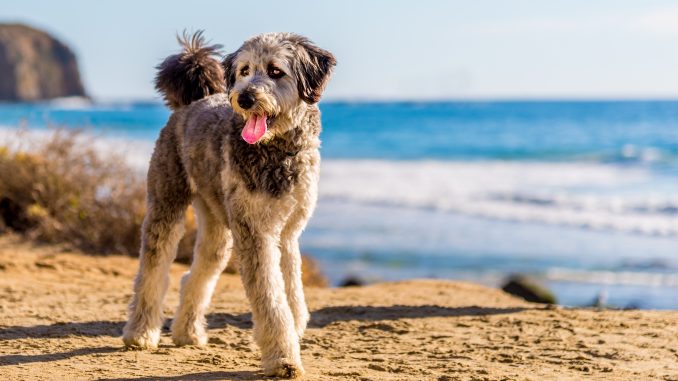

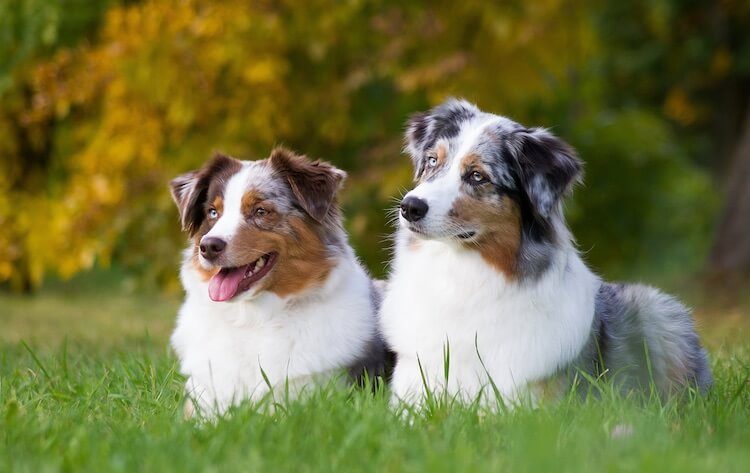



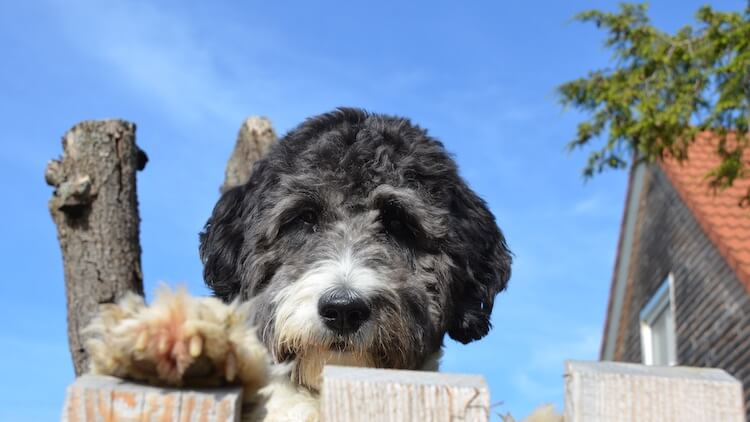


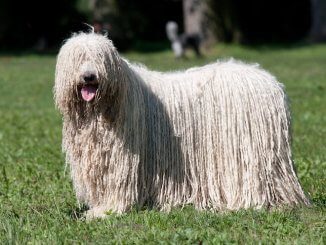
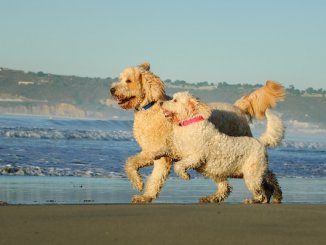
Can you breed a mini Australian Shepherd with a male standard poodle?
Yes. Mine has a mini Aussie as the mom and a standard Poodle as the dad. He’s 4 months now and weighs around 18lb.
Is it possible to breed a Toy poodle with a Standard Aussie? the aussie being the mother and the toy poodle being the dad.
Hi Michelle, Yes! There are lots of toy poodle mixes, you can read more about them here.
Can you breed 2 aussiedoodles? Will that make an aussiedoodle? Thank you
Hi Sheika, yes this will make a F2 aussiedoodle (second generation)
If the mom is the Aussie dooldle and the dad is the standard doodle can the child be a medium size dog.
If the mom is a golden doodle and the dad is an australian shepherd, is the puppy still an Aussie doodle?
I Have an Aussie doodle and they are amazing but barky. nothing to stop you from loving them.